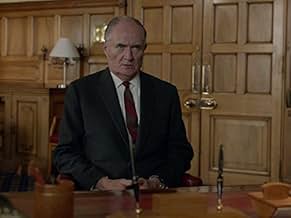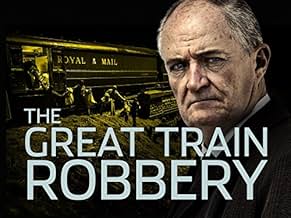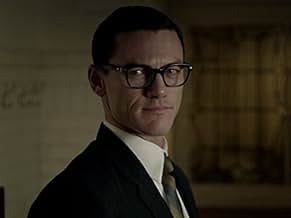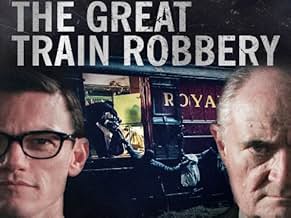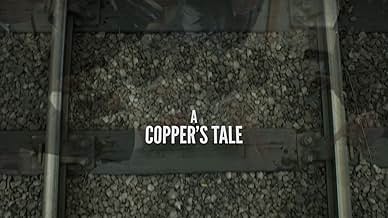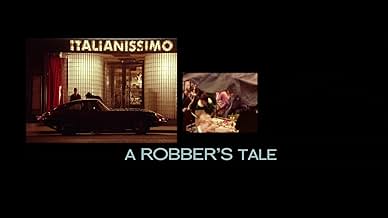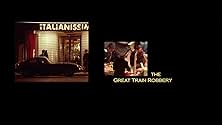IMDb-BEWERTUNG
7,3/10
5291
IHRE BEWERTUNG
Ein zweiteiliges Drama, das den Großen Zugüberfall vom 8. August 1963 schildert, zunächst aus der Sicht der Räuber und dann aus der Sicht der Polizei, die sich auf die Suche nach den Räubern... Alles lesenEin zweiteiliges Drama, das den Großen Zugüberfall vom 8. August 1963 schildert, zunächst aus der Sicht der Räuber und dann aus der Sicht der Polizei, die sich auf die Suche nach den Räubern macht.Ein zweiteiliges Drama, das den Großen Zugüberfall vom 8. August 1963 schildert, zunächst aus der Sicht der Räuber und dann aus der Sicht der Polizei, die sich auf die Suche nach den Räubern macht.
- Stoffentwicklung
- Hauptbesetzung
- Nominiert für 1 BAFTA Award
- 4 Nominierungen insgesamt
Folgen durchsuchen
Empfohlene Bewertungen
This almost documentary style film made for interesting viewing, and this may have been Luke Evans' first leading role, and he grabbed the opportunity with lots of panache. As the leader of the band of robbers who pulled off the heist, I had some difficulty in focusing on who he was as Buster Edwards and Ron Biggs were always better known. The film however did show that this was a big gang of thieves, and this probably led to their undoing. The actual heist took up little screen time, the rest dealt with the dynamic between the gang, and the motivation of the ringleaders apart from the usual greed, is clearly shown. I enjoyed it, there was always the feeling that this was a gang who were in over their heads, and there is one telling moment when they realize it after counting the money.
The early sixties setting with its talk of the war years and exploits of that time is well realized, making this a series to be enjoyed. Martin Compston had a small but significant role as well.
The second instalment is just as fascinating when you are given the opportunity to see the trail of clues the gang left behind them in the old farmhouse, even after 'apparently' cleaning up! A restrained but driven Jim Broadbent gives the sense of urgency the Police felt about solving this crime, and it says much about the actors concerned, that you almost wanted the robbers to get away with it! Perhaps that explains the success of later series like Money Heist which focus on that.
The early sixties setting with its talk of the war years and exploits of that time is well realized, making this a series to be enjoyed. Martin Compston had a small but significant role as well.
The second instalment is just as fascinating when you are given the opportunity to see the trail of clues the gang left behind them in the old farmhouse, even after 'apparently' cleaning up! A restrained but driven Jim Broadbent gives the sense of urgency the Police felt about solving this crime, and it says much about the actors concerned, that you almost wanted the robbers to get away with it! Perhaps that explains the success of later series like Money Heist which focus on that.
At the time, the Great Train Robbery was the biggest theft in British criminal history and was as much a part of 1963 here as the Profumo Scandal and the emergence of the Beatles. With the fiftieth anniversary of significant events in that year being commemorated right left and centre (the making of the first Beatles album, the first Dr Who TV show, of course the Kennedy assassination), I guess this notorious occurrence was also too big to miss.
With a large cast consisting of some of the best of British male acting talent (female characters hardly get a look-in), painstakingly accurate set design not to mention the actual train itself, the component parts were all there and waiting to be assembled into place. The imaginative decision to break it into two films, the first part concerning the planning and execution of the crime itself and focusing on the criminal gangs which came together to do the misdeed, the second, the aftermath, concentrating on the police investigation run by Jim Broadbent's tough-as-old-boots D.I Tommy Butler, was, on paper, a good one and for the first half certainly successful.
In part one, we see the scheme being formulated by Luke Fisher's bespectacled (obviously marking him out as the brains) Bruce Reynolds the coordinator of the operation, including the recruitment of the necessary personnel, implementation of the crime and the plan on how to escape the law after the robbery. Pacily directed and well-acted by the whole group, the viewer is completely taken into the criminal world and despite myself, caught up in the anticipation and even excitement as they set about their dirty work. I must admit my distaste at the scene where they realise the enormity of what they've done and celebrate with abandon, even though I knew they didn't get away with it for long.
Which leads onto part two, which I felt was altogether less successful. The narrative changes tack and now follows the police investigation into the crime with Broadbent and his weary men one by one picking off the assembled pictures of the perpetrators on their incident-room notice board. Unfortunately at this point the director decides that Broadbent and his team are the UK equivalent of The Untouchables so that we get endless shots of Broadbent grimly gazing at the camera and when they walk, it's in De Palma-esque slow-motion. All the artifice that was stripped away in the impressive first 90 minutes is overloaded into the second one and while there's still drama in watching all the villains get their come-uppance, you completely lose the sense of authenticity built up thus far. The soundtrack was confusing too, quite why 50's Frank Sinatra songs proliferate, I can't tell and for some reason the great Spencer Davis Group song "I'm A Man", cut in 1966 gets played as the background to events from three years before. The use of Nina Simone songs, especially "Sinner Man" did work better but again, like the overall production, they only got this part half-right too.
I almost thought that the two parts must have been directed by two different directors but no, it was just poor execution of a good plan, sort of like how the robbers handled their getaway.
With a large cast consisting of some of the best of British male acting talent (female characters hardly get a look-in), painstakingly accurate set design not to mention the actual train itself, the component parts were all there and waiting to be assembled into place. The imaginative decision to break it into two films, the first part concerning the planning and execution of the crime itself and focusing on the criminal gangs which came together to do the misdeed, the second, the aftermath, concentrating on the police investigation run by Jim Broadbent's tough-as-old-boots D.I Tommy Butler, was, on paper, a good one and for the first half certainly successful.
In part one, we see the scheme being formulated by Luke Fisher's bespectacled (obviously marking him out as the brains) Bruce Reynolds the coordinator of the operation, including the recruitment of the necessary personnel, implementation of the crime and the plan on how to escape the law after the robbery. Pacily directed and well-acted by the whole group, the viewer is completely taken into the criminal world and despite myself, caught up in the anticipation and even excitement as they set about their dirty work. I must admit my distaste at the scene where they realise the enormity of what they've done and celebrate with abandon, even though I knew they didn't get away with it for long.
Which leads onto part two, which I felt was altogether less successful. The narrative changes tack and now follows the police investigation into the crime with Broadbent and his weary men one by one picking off the assembled pictures of the perpetrators on their incident-room notice board. Unfortunately at this point the director decides that Broadbent and his team are the UK equivalent of The Untouchables so that we get endless shots of Broadbent grimly gazing at the camera and when they walk, it's in De Palma-esque slow-motion. All the artifice that was stripped away in the impressive first 90 minutes is overloaded into the second one and while there's still drama in watching all the villains get their come-uppance, you completely lose the sense of authenticity built up thus far. The soundtrack was confusing too, quite why 50's Frank Sinatra songs proliferate, I can't tell and for some reason the great Spencer Davis Group song "I'm A Man", cut in 1966 gets played as the background to events from three years before. The use of Nina Simone songs, especially "Sinner Man" did work better but again, like the overall production, they only got this part half-right too.
I almost thought that the two parts must have been directed by two different directors but no, it was just poor execution of a good plan, sort of like how the robbers handled their getaway.
I was born any a couple of months after the great train robbery, back in 1963. And I have always been fascinated by it. My dream would be to go on the actual place where it occurred, the Bridego Bridge. I possess nearly every document about it, footage archive and fiction material. The most memorable, of course, remains Peter Yates's ROBBERY, back in 1967, and the other movie starring the actor starring Derrick - sorry I don't remember his name. Some viewers said on IMDb that this feature was not flawless, concerning details specified to UK, for instances trains and cars from this very era. Well, I have never lived in UK, so...But concerning this film, the only thing that annoyed me was the BOAC company heist, at the beginning. These guys are supposed to be professional robbers with a criminal record as thick as a phone book, and they pull the heist without any gloves !!!! Because finger prints, see? Rubbish. For the rest, it is a terrific piece of work, and the character description is absolutely outstanding. I loved the very ending when Bruce Reynolds tells the hard boiled inspector from SY, who chased them in such a raging way all over the years, that he did not do this for money but for "camaraderie" as he actually said, using a french word meaning companionship, brotherhood among friends. An outstanding face to face between those two adversaries. An authentic masterpiece. But it could have shown the several escapes from jail of some of the great train robbers.
I enjoyed this first episode although of course we all know the story. And an important part of the story is that it all happened in August of 1963. Now I was only 4 years old that year so cant quite remember what the summer of '63 was like but I would bet a large amount of money (maybe even 2.1 million pounds)on a couple of things...first there were probably leaves on the trees and secondly it is doubtful that there was snow on the ground and indeed falling in London...in the middle of August!!! What were the producers thinking? During the episode there are several captions giving the date...including the 8th August 1963. Why or why did they create a setting that looked like January or February! There wasn't even any attempt to produce a blue sky! A good film, well acted and written but ruined by the weather! Only in England!!!
Since the story based on real events is known, I expect the film to be a little more than a purely chronological sequence of the plot. In addition to Luke Evans, the actors are not very prominent and join the monotone pattern. The film could have been more, but in the end it is a boring TV production in my eyes. And after all two long
Wusstest du schon
- WissenswertesRonald Biggs, one of the last surviving Great Train Robbers, died on 18 December 2013, the same day that this two-part series was first shown.
- PatzerPolice Officers are shown wearing white shirts. In 1963 Constables and Sergeants in all English police forces wore blue shirts. The change to white shirts came in the late 1970s.
- VerbindungenReferences Der große Eisenbahnraub (1978)
Top-Auswahl
Melde dich zum Bewerten an und greife auf die Watchlist für personalisierte Empfehlungen zu.
- How many seasons does The Great Train Robbery have?Powered by Alexa
Details
- Erscheinungsdatum
- Herkunftsland
- Offizieller Standort
- Sprache
- Auch bekannt als
- The Great Train Robbery
- Drehorte
- Produktionsfirmen
- Weitere beteiligte Unternehmen bei IMDbPro anzeigen
- Laufzeit1 Stunde 30 Minuten
- Farbe
Zu dieser Seite beitragen
Bearbeitung vorschlagen oder fehlenden Inhalt hinzufügen

Oberste Lücke
What is the French language plot outline for Der große Eisenbahnraub 1963 (2013)?
Antwort


